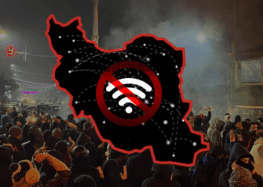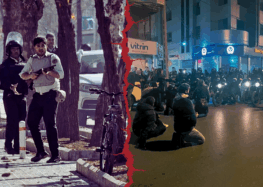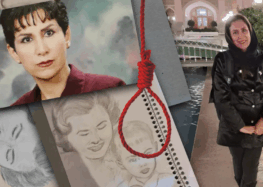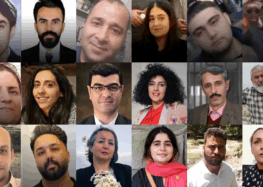Urgent Appeal from Evin Prison: Imprisoned Scholar Mahvash Seydal Exposes Iran’s Denial of Medical Care to Women Political Prisoners
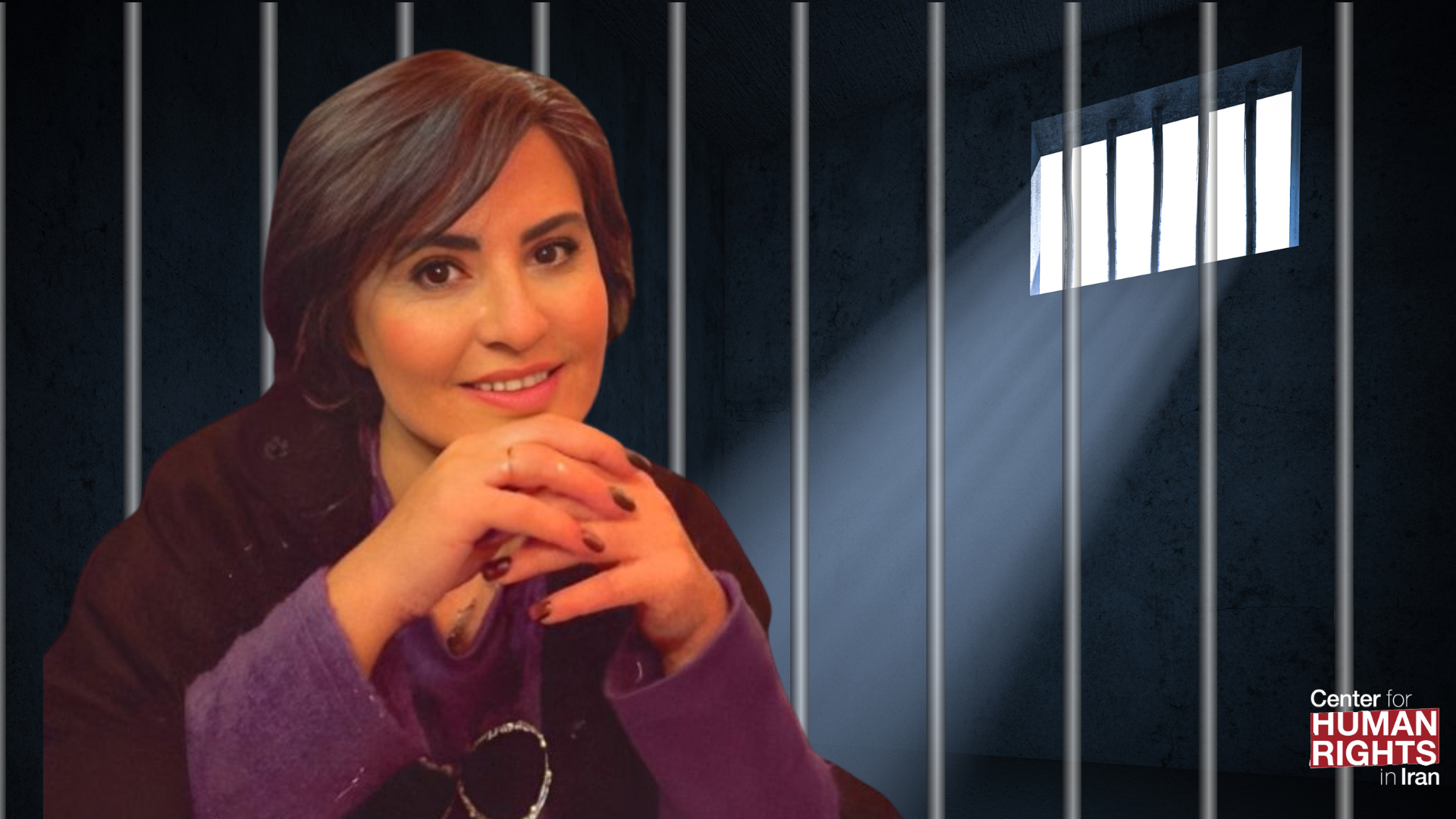
Systematic Denial of Medical Care in Iran: A Slow and Silent Execution
May 27, 2025 — From Evin Prison, woman political prisoner and international law scholar Mahvash (Sayeh) Seydal has issued an urgent open letter to international human rights bodies, warning of the alarming denial of medical care faced by women prisoners—especially political detainees. She calls for an immediate investigation and independent oversight of the women’s ward at Evin, where access to basic healthcare is severely restricted and denial is often used as a tool of punishment.
The intentional denial of adequate medical care to prisoners—especially political detainees—is a widespread and systematic practice in Iran that amounts to cruel, inhuman, and degrading treatment under international law and is tantamount to torture.
“I Mahvash (Sayeh) Seydal, PhD in International Law and political prisoner at Evin Prison, hereby declare that as of May 26, 2025, I have begun a hunger and medicine strike due to systemic violations of my right to adequate healthcare and punitive restrictions including visitation and phone bans,” Seydal announced on Monday, May 26.
“My demands include: Immediate lifting of communication bans, guaranteed, non-discriminatory access to medical care, reform of prison healthcare systems, international monitoring and investigation of human rights violations in Iranian prisons,” she said.
Prisoners in Iran, especially political prisoners and prisoners of conscience, are routinely deprived of access to specialized treatment, even for life-threatening conditions, with prison authorities delaying or denying hospital transfers and restricting medication. Medical decisions are often subject to approval by security agencies, turning healthcare into a tool of repression. The result has been irreversible harm to prisoners, and in some cases, death.
In March 2025, the Center for Human Rights in Iran (CHRI) published a report revealing the Iranian government’s systematic denial of medical care in prisons, leading to preventable deaths—many of which go unreported. A lack of transparency allows prison officials to falsify causes of death, while families, even when highly suspicious, often remain silent out of fear of state retaliation. In such cases, no officials are held accountable, and no independent body inside Iran monitors prison health conditions.
In August 2024, CHRI published a list of 34 political prisoners in Iran who were systematically denied access to proper medical services, including access to prescribed treatments, medicines and medically required transfers to hospitals for treatment outside the prisons.
Iran’s prisons are widely documented as overcrowded, unsanitary, and severely lacking in essential services and healthcare infrastructure, operating well below international minimum standards for detention. Prisoners are routinely denied access to clean drinking water, adequate food, and proper hygiene. Overcrowded and poorly ventilated cells, often infested with insects and rodents, contribute to the rapid spread of disease and endanger inmates’ health.
The denial of medical care in Iran’s prisons is not only an egregious violation of international and Iranian law, it is a human rights emergency.
CHRI calls on governments worldwide, international legal and medical organizations and human rights bodies to press for independent oversight of Iran’s prisons, the immediate provision of full and proper medical care for all prisoners, and accountability for officials involved in the denial of medical care.
Read the full text of Mahvash (Sayeh) Seydal’s open letter below.
To International Human Rights Monitoring Bodies
The Right to Health: A Casualty of Politics
I, Mahvash (Sayeh) Seydal, holder of a PhD in International Law and a political prisoner currently detained in the women’s ward of Evin Prison, hereby report—based on my position as a victim, witness, and legal expert—the widespread violation of the fundamental rights of female prisoners, particularly political prisoners, within the healthcare system of the prisons of the Islamic Republic of Iran. This statement is addressed to the international public, relevant UN mechanisms, and specialized institutions.
What is occurring here is not merely accidental deprivation of medical care—it represents a politicized and discriminatory pattern of denying the right to health, human dignity, and protection from torture.
A. Documented Cases of Violations of Female Prisoners’ Right to Health and Medical Care
1. Chronic Absence of a General Physician in the Women’s Ward
In the women’s ward of Evin Prison, where inmates have an average age of 56, there is not even one resident general practitioner. In emergencies, fellow inmates must transport the patient on a stretcher to the prison clinic. This condition starkly contradicts the fundamental principles of “humane treatment of prisoners” and constitutes a violation of Article 10 of the International Covenant on Civil and Political Rights (ICCPR).
2. Absence of Nurses for Large Parts of the Week
For at least three days each week, there are no nurses present in the ward. During these times, even basic medical needs such as bandaging or monitoring vital signs go unmet. The Nelson Mandela Rules (UN Standard Minimum Rules for the Treatment of Prisoners) clearly state that basic healthcare must be continuously available and accessible—this principle is effectively violated here.
3. Politicized Restrictions on Access to Medical Specialists
Access to specialist doctors is contingent on approval by the judicial-security institutions of the Islamic Republic. This politicized screening process effectively subordinates healthcare rights to security concerns, violating the principle of equal access to medical care without discrimination as outlined in Article 12 of the International Covenant on Economic, Social and Cultural Rights (ICESCR). When specialists are permitted, their presence lacks regularity and consistency, rendering treatments ineffective.
4. Substandard Medical Facilities, Exhausting Referral Procedures, and Imbalanced Costs
Partner hospitals—including Taleghani and Imam Khomeini—are overcrowded and lack the necessary standards. Moreover, referral of patients outside the prison involves a prolonged, bureaucratic, security-heavy process that often takes several months. Even in emergencies, prisoners must wait in line for official approval to receive specialized examinations or critical imaging.
In practice, the prison healthcare system has become a tool for physically and mentally exhausting political prisoners. Under international law, this approach may be considered inhuman and degrading treatment under Article 7 of the ICCPR and Article 1 of the Convention Against Torture (CAT).
In addition, the majority of medical expenses—despite the prison’s insurance coverage—are imposed on the prisoners themselves. For those who are unemployed and lack financial support, this amounts to a form of punitive financial burden that further denies them their right to health.
B. Legal Analysis and Reference to International Standards
By ratifying international covenants such as the ICCPR, ICESCR, and other human rights treaties, the Islamic Republic of Iran has undertaken binding obligations to guarantee the rights to life, health, dignity, and medical care for prisoners. Violations of these obligations—whether intentional or due to structural neglect—constitute international legal responsibility for the state.
UN reporting mechanisms—including the Special Rapporteur on the situation of human rights in Iran, the Working Group on Arbitrary Detention, the Special Rapporteur on Torture, and the Special Rapporteur on Violence Against Women—can and should document and investigate this situation in their official reports.
C. Formal Appeals
As a female political prisoner, an international law expert, and an eyewitness, I formally request that the following bodies:
-
- The United Nations Human Rights Council
- The UN Special Rapporteur on Human Rights in Iran
- The UN Special Rapporteur on Violence Against Women
- The UN Working Group on Arbitrary Detention
- Amnesty International, Human Rights Watch, FIDH, and other human rights NGOs
take immediate action with regard to the following points:
-
- Documenting and recording the medical conditions in the women’s ward of Evin Prison;
- Applying pressure for the enforcement of the principle of “Due Diligence” in ensuring the right to health and preventing the silent deaths of prisoners;
- Opening pathways for international and independent monitoring of health and hygiene conditions in prisons—particularly Evin Prison;
- Compelling the Islamic Republic of Iran to comply with minimum health standards in prisons and to eliminate political discrimination in access to medical services.
D. Conclusion
The healthcare system governing the women’s ward of Evin Prison is not merely inefficient—it serves a deliberate policy aimed at the physical and psychological degradation of imprisoned women, particularly political opponents. This situation is not only a clear violation of Iran’s international obligations but constitutes an ongoing human rights crisis that must be prioritized by oversight bodies.
With respect and a commitment to truth,
Mahvash (Sayeh) Seydal
PhD in International Law
Evin Prison – Women’s Ward
Iran | (May 2025)



